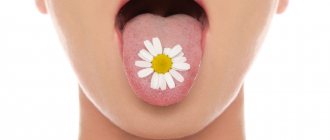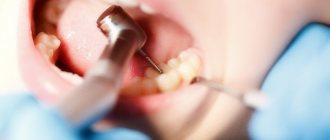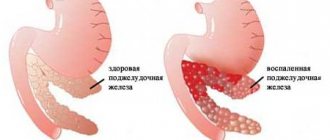What could cause such a taste and is it necessary to panic?
This symptom often occurs when small capillaries in the larynx are damaged due to severe tension. In this case, there is absolutely no reason to worry.
Much less often, streaks of blood can be found in sputum. This symptom is very unfavorable and dangerous, which means it requires immediate consultation with a specialist. Even a doctor cannot always immediately determine the cause of the appearance of blood in the sputum and explain why the iron taste has developed. For this purpose, you should undergo an examination, which may include an impressive number of diagnostic procedures.
In case of minor bleeding and the patient’s relatively stable condition, you can go to the clinic. However, there are a number of situations that require emergency medical care. They involve calling an ambulance to your home. These include:
- The presence of blood streaks in the sputum;
- Cough with copious scarlet-colored bloody discharge;
- Severe shortness of breath, pain in the chest;
- Cough with difficulty inhaling or exhaling;
- There was an injury before the cough and taste of blood or iron developed;
- The iron taste, as well as blood in the mouth, appeared without a previous cough.
At home, first of all, it is necessary to eliminate violations of the integrity of the oral mucosa, since they can cause such a taste. But this only applies to the situation when there is no cough. In all other situations, you should call an ambulance as an emergency.
Causes
The most common reasons for the development of such clinical manifestations are:
- Oncological processes localized in the bronchi or lungs. They can be complicated by hemoptysis or bleeding, which is often bright red. Concomitant manifestations may include severe chest pain, shortness of breath, and weight loss;
- Severe pneumonia, especially lobar, legionella and others;
- Pulmonary tuberculosis - very often accompanied by hemoptysis, as it is characterized by destruction of lung tissue;
- Chronic obstructive bronchitis, chronic obstructive pulmonary disease. These pathologies are difficult to treat, and blood or an unpleasant taste of iron may occur due to trauma to the capillaries caused by a hacking cough;
- Bronchiectasis. With it, the cough continues for a fairly long period of time, the sputum may contain bloody streaks that appear there due to the same mechanism as with bronchitis;
- Lung abscess is one of the most common complications of pneumonia in the absence of proper treatment or immunodeficiency. In addition to the taste of blood and metal in the mouth, there is an unpleasant putrid odor due to the accumulation of pus in the abscess cavity;
- Diseases of the cardiovascular and respiratory systems. With these pathologies, heart failure and pulmonary hypertension develop, which can also lead to a iron taste in the mouth;
- Cystic fibrosis is a genetic pathology characterized by frequent colds accompanied by cough. As with pneumonia, a complication may be the appearance of a iron taste in the mouth;
- Diseases of the digestive system. With them, such clinical manifestations develop due to the appearance of bleeding in the digestive canal. These bleedings also develop when there is no cough. Associated symptoms are weight loss, pale skin, blackening of stool, and in some cases, vomiting of blood.
- Heavy metal poisoning can be characterized by the development of a metallic taste in the mouth.
In some cases, iatrogenic causes of this condition are possible, for example, after esophagogastroduodenoscopy, ENT operations - removal of adenoids and tonsils. In such a situation, the metallic taste disappears after some time without any outside help.
Source: stoporvi.ru
What measures should be taken
In most cases of unknown etiology, the metallic taste disappears unnoticed , as after recovery from the disease. First of all, it is necessary to examine the oral mucosa and the surface of the pharynx and larynx for scratches or ulcerations.
If the appearance of a taste is caused by a disease and is complicated by additional symptoms , you should consult a diagnostician to prescribe appropriate treatment.
Important! The main thing is to exclude serious diseases - lung cancer, emphysema, and to prevent chronic inflammatory processes in the organs of the respiratory system.
General recommendations and prevention
- Clean your mouth regularly, don’t forget to brush your tongue;
- enrich your diet with citrus fruits and foods that promote increased salivation, which will change your taste sensations;
- try to use drugs that regulate stomach acidity less often;
- do not eat food from metal utensils;
- mouth rinse. You can use a solution of salt in water - 1 tsp. for 250 ml (glass) of water.
Iron taste in the mouth: what does it mean?
The taste of iron when coughing is not always a sign of a disease of the respiratory system. Most people associate the taste of metal in the mouth with blood. This is the case: the primary cause of this symptom is anemia with a lack of vitamin B12 or folic acid.
In the throat you can feel the taste of iron in diseases of the gastrointestinal tract, pancreas, especially if it is accompanied by a sour aftertaste.
«>
The appearance of an iron taste in the mouth can occur during pregnancy if there is a lack of B vitamins due to refusal of food of animal origin.
Recommended reading: Blood in saliva without coughing.
Which doctor should I contact and diagnostic methods?
Important! Before contacting a specialist, it is necessary to conduct a self-analysis and pay attention to the intensity of the unpleasant taste, its duration and accompanying symptoms.
The latter can be of fundamental diagnostic importance in searching for the cause of the pathology. You should pay attention to the following pathological signs :
- presence of pain;
- flatulence;
- shortness of breath and cough;
- constipation or diarrhea;
- heartburn and chest discomfort;
- the presence of inflammatory foci in the oral cavity and nasal cavity;
- changes in the mucous membranes;
- increased body temperature;
- irritation, inflammation, ulceration of the skin;
- swelling of the legs, face and other parts of the body;
- fatigue;
- headache;
- decreased sleep quality;
- weight loss or weight gain;
- decreased or other disturbances of vision, smell, hearing, sensitivity.
The initial contact may be with a general practitioner or therapist. The doctor will conduct a preliminary diagnosis and determine the further course of treatment and diagnostic measures.
If other symptoms are identified along with a specific taste , you can immediately contact a specialized specialist.
For flatulence, constipation, weight loss, pain and discomfort in the gastrointestinal tract, you should consult a gastroenterologist .
Swelling, lower back pain, shortness of breath are reasons to visit a neurologist or urologist .
Need to know! In case of defects in the oral or nasal cavity, the attending physician will be a dentist and an otolaryngologist.
After the initial visit, a general clinical minimum of examinations . These include:
- general analysis and biochemical blood test;
- general urine analysis;
- urine analysis according to Nechiporenko and Zimnitsky;
- general stool test + reaction to occult blood;
- fluorography of the lungs;
- Ultrasound of internal organs;
- fibrogastroduodenoscopy with mucosal biopsy and testing for Helicobacter pylori.
After preliminary diagnosis, the doctor determines further tactics . If there are indications, he conducts more highly specialized examinations.
These include computed tomography, magnetic resonance imaging, radiography of the affected area, urography, glycemic profile of daily blood sugars, etc.
The main causes of a metallic taste in the mouth
The taste of iron in the mouth when coughing can appear with the following diseases:
- Bronchial asthma. A chronic disease of the respiratory system, which is characterized by a narrowing of the lumen of the bronchi, as well as a violation of the ratio of various cellular elements in the structure of the bronchi.
- Sinusitis. You can feel “blood breathing” with sinusitis, frontal sinusitis, and ethmoiditis. This is especially noticeable if you blow your nose a lot due to difficult sputum discharge.
- Pharyngitis and larigitis. Severe inflammation in the pharynx and larynx can cause a bloody taste in a person’s mouth.
- Bronchiectasis, pulmonary emphysema. If, after many years of chronic respiratory diseases, you have a metallic taste in your mouth when you cough, there is cause for concern. Bronchiectasis and emphysema are serious and fatal diseases if not treated properly. They arise due to differences in the ventilation and diffusion capacity of the lungs.
- Tuberculosis. At the last, open stage of this disease, a person begins to cough up bloody discharge. It is not surprising that there is a sensation of the taste of blood in the mouth.
- Oncology. Malignant neoplasms tend to damage tissue, as do benign ones, which can lead to disruption of the integrity of blood vessels in the lungs. Accordingly, with a strong cough you will feel the taste of iron.
Recommended reading: What to do if you have a bitter taste in your mouth when you cough?
«>
These diseases directly affect the respiratory system, but they are not the only ones that can cause similar symptoms. The taste of iron in the mouth also occurs when:
- Taking certain types of antibiotics, antidepressants, antihypertensives, and diabetes medications.
- Incomplete removal of the contrast agent after an x-ray or tomography with contrast.
- Getting small particles of metal dust into the oral cavity and respiratory tract.
- Heavy metal poisoning.
- Pathologies of the pancreas, allergic reactions to food.
- Anemia, avitaminosis of B vitamins, disturbances in the composition of circulating blood.
To confirm a particular diagnosis, it is necessary to conduct laboratory, clinical, and instrumental studies.
What to do
If a sour taste in the mouth is accompanied by pain in the epigastric region, heartburn and belching, you should consult a gastroenterologist.
If the sour taste is not accompanied by other symptoms , then it will be enough to make adjustments to your lifestyle:
- give up cigarettes and alcohol;
- eat in small portions;
- exclude salty, sweet and fatty foods;
- eat vegetables and fruits in sufficient quantities;
- clean the oral cavity of food debris (especially in the evening).
A decoction of flax seeds or chamomile flowers will help effectively eliminate the sour taste
Photo 3: In the last weeks of pregnancy, a woman may experience a constant sour taste in her mouth. This phenomenon is considered normal and goes away immediately after childbirth. Source: flickr (Evgeniy rumedicalnews).
To eliminate bitterness in the mouth, the doctor prescribes medications that help normalize the functioning of the gallbladder and liver.
To quickly eliminate the first signs of the appearance of an unpleasant odor and bitter-tasting saliva, you can use choleretic herbal preparations.
If bitterness appears after a stressful situation or nervous strain, you can drink an infusion of hawthorn or motherwort.
If sweet-tasting saliva appears, you should reconsider the food you eat:
- It is temporarily necessary to stop consuming large amounts of carbohydrates, processed foods and sugary carbonated drinks.
- After each meal, you should rinse your mouth with a weak solution of soda and salt.
- Rinsing with a decoction of sage or chamomile will also help get rid of the sweetish taste. Eating citrus fruits will help refresh your mouth and get rid of the unpleasant aftertaste.
Alarming symptoms
If you have a metallic taste in your mouth after coughing, you should not panic ahead of time. Only in the aggregate of a number of symptoms can one really become concerned and go to the doctor for further investigation.
You can go to the doctor at any time convenient for you in the following cases:
- You do not experience significant discomfort due to the taste and smell of iron appearing in your mouth. This symptom does not bother you.
- In the event that the oral cavity is visited by the smell of iron only from time to time, also without causing you significant inconvenience.
- If, apart from the unpleasant taste and smell, you do not feel any other symptoms.
Additional manifestations of the disease, such as headaches, weakness, apathy, loss of strength, drowsiness, inadequate skin color, digestive problems, and signs of intoxication, may be a reason for suspicion.
Maybe,
Remedies
Remember! An unpleasant specific taste in the mouth can be eliminated only if it is not a symptom of a serious disease resulting from chemical and physiological disorders.
The following methods effective :
- Compliance with the rules of oral hygiene. Teeth brushing and rinsing should be done after every meal.
- Observation at the dentist. A timely visit to a specialist will help avoid the development of pathological conditions.
- Normalization of diet. You should exclude sweets, fatty and fried foods, and give preference to steamed or charcoal-cooked dishes. The diet should consist of vegetables and a small amount of lean meat and fish.
bay leaves is good at eliminating unpleasant tastes . A few bay leaves are placed in a glass and poured with boiling water.
Let it brew overnight and consume in small portions 5-7 times a day, you can rinse your mouth.
For your information! Similar to this recipe, a decoction based on chamomile, oak bark and other plants is prepared.
If the effect does not occur within several days, then this is a reason to consult a specialist.
Why does the disease appear?
A cough with a hint of iron is a symptom of many abnormalities. They are not always associated with damage to the respiratory system. The manifestation of the symptom can be caused by various ailments. A iron taste indicates the presence of blood. This is usually due to internal bleeding or decreased iron levels in the body. Experts say that a metallic taste is often accompanied by the following symptoms:
- prostration;
- dizziness;
- paleness of the skin;
- drowsiness.
The most common causes of iron taste in the mouth include:
- Pathologies of the gastrointestinal tract. Usually the disease is caused by an ulcer. With this disease, the patient complains of a gag reflex and constant nausea. Often, abnormalities in the liver and pancreas also cause a taste of blood in the mouth. If they do not function properly, the patient complains of a feeling of bitterness, decreased performance and nausea.
- Improper functioning of the hearing organs, nose and throat. An unpleasant taste may appear when there is a large amount of discharge from the nasal passages. When clearing the nose, a person can cause capillaries to rupture. After this, an undesirable symptom will be observed. Often people also confuse the taste of iron in the mouth after a cough with that which accompanies the fight of the immune system against pathogenic microorganisms.
- Lack of certain vitamins and microelements in the body.
- Use of certain medications.
- Visiting the dentist and having metal crowns installed in your mouth.
Typically, an unpleasant taste in the mouth is also accompanied by dry mouth. This symptom is almost always present in those people who have diabetes or abnormalities in the functioning of the thyroid gland. The taste can sometimes become sour.
A lack of iron, which provokes the appearance of an unpleasant symptom, can be indicated by the presence of cracks in the tongue. If such a symptom is present, there is no doubt about iron deficiency anemia. It remains to confirm the diagnosis with certain tests.
A metallic taste in the mouth after coughing may occur during the use of certain medications. This usually occurs when using antibacterial drugs.
Homeopathic treatment
Homeopathic treatment is highly effective and has minimal side effects . If you follow the recommendations of a homeopathic doctor and use the correct dosage, you can quickly get rid of an unpleasant feeling in the mouth.
An unpleasant taste in the mouth is a nonspecific symptom of the onset of diseases. It usually appears immediately after waking up and does not change depending on the food and drinks consumed. The degree of symptom manifestation depends on the nature of the pathology and the presence of predisposing etiological factors.
When you need to urgently visit a doctor
If you have a dry cough and an unpleasant taste in your mouth, you may need urgent consultation with a specialist. It is worth noting that no doctor can identify the root cause of the disease during the initial examination. It is impossible to do without additional examinations.
The table below shows cases when you need to see a doctor urgently, and when his visit can wait several days.
| When can you make an appointment with a doctor on any convenient day? | When an ambulance may be needed |
| A visit to a specialist can be postponed for several days if the metallic taste in the mouth does not cause any particular discomfort. | Urgently calling emergency help will be required if the patient experiences the presence of not only an iron taste in the mouth, but also sputum interspersed with blood. Bloody streaks may also be observed. |
| A hospital visit may be delayed slightly if the taste only occurs occasionally. | Emergency assistance should also be called when, in addition to coughing, the patient has asthma attacks. |
| You can postpone visiting a doctor if the symptom is not accompanied by other negative symptoms. | Immediate examination by medical professionals is necessary for the patient if a metallic taste appears after any injury has been suffered. |
| An ambulance is urgently needed when the unpleasant taste is not accompanied by a cough and it appears on its own. | |
| A smoker should immediately visit the hospital if he has an unwanted taste in his mouth. | |
| Help is needed if the taste, similar to the sensations when licking an iron object, does not go away for a long period of time. |
If you have a condition that does not require urgent help, you can visit a doctor on any convenient day. However, this does not mean that you do not need to see a doctor at all. You will need to visit the hospital in the next few days.
What to do and who to contact?
A therapist will help you deal with this problem.
How he will do it:
- Recognizes patient complaints and symptoms. Ask questions about nutrition, sleep patterns, and oral hygiene. Will conduct an inspection.
- Prescribe the necessary blood and urine tests. Thus, it will find out which vitamins are missing, and whether there are any diseases that contribute to unpleasant taste sensations.
- Based on test results and symptoms, he will prescribe medications. Will tell you detailed steps and solutions for bad taste in mouth.
If the test results show that there are infectious or viral diseases in the body, the doctor is obliged to redirect you to a specialized medical specialist.
Remember! If there is any deviation of your immune system from the norm, you should consult a doctor. Only they can prescribe the correct and necessary treatment to solve problems. And our article will help you find out the possible reasons and not panic until a specialist’s verdict.
- Yakubovich called “the most expensive gift” in the history of the Field of Miracles program
- Why does my voice shrink? Hoarseness can be a sign of serious illness
- Avia.pro: The Azerbaijani army destroyed one of the most advanced radars in the world in Karabakh
- The Azerbaijani army fired at a Russian border post on the Iranian border
- “Reporter”: DPR and LPR presented a “surrender plan” to Ukraine at the negotiations on Donbass
- The DPR made an emergency statement about a “rebellion” against the truce at the positions of the Ukrainian Armed Forces in Donbass
Become a member of the CLAN and every Tuesday you will receive the latest issue of “Arguments of the Week” with a discount of more than 70%, along with exclusive materials not included in the newspaper. Get premium access to a library of the most interesting and popular books, as well as an archive of more than 700 published issues for FREE. In addition, you will have the opportunity to benefit from free legal advice from our experts for a whole year.
- Enter your email address, then select any convenient payment method for your annual subscription
- Scan the QR. In the Sberbank Online application that opens, enter the annual subscription cost (490 rubles). Then send the confirmation code by email
Or
Symptom during pregnancy
Pregnancy is a very difficult period in the life of every woman. At this time, the girl’s body is actively restructuring. He is trying to adapt to his new condition. For this reason, a pregnant woman’s body can weaken significantly. Often girls feel as if there is iron in their mouth (for example, crowns). This unpleasant symptom in pregnant women is often accompanied by a slight cough. Typically, the disease signals a reduced level of hemoglobin in the blood. At the same time, there may be no need for drug treatment.
Metallic taste in pregnant women may be preceded by:
- changes in hormonal levels;
- increased sense of smell;
- the use of certain vitamin complexes;
- disturbances in the gastrointestinal tract;
- problems with teeth and oral cavity.
If there is sputum with blood when coughing, which is accompanied by an unpleasant taste, the pregnant woman should urgently go to the hospital.
To get rid of pathological taste, the girl is recommended to reconsider her diet. Certain foods will need to be included. Most often, a dry cough with an unpleasant taste occurs in an expectant mother due to hormonal imbalance. During this period, the girl’s production of certain hormones that are responsible for taste buds increases. A woman begins to perceive ordinary food products differently.
You may also need to visit your dentist. Bleeding gums, dental problems - this can also cause a dry cough with a hint of iron. Typically, this cause of the disease does not pose a serious danger.
Characteristic symptoms
An unpleasant, strange taste in the mouth is an alarming symptom and may indicate the presence of pathology in the human body. As a rule, this sign does not appear as an independent symptom, but is accompanied by certain concomitant phenomena.
If a patient has a disease of the gastrointestinal tract, it tends to spread to other organs. To clarify the diagnosis, it is necessary to pay attention to other symptoms, for example:
- Flatulence.
- Pain in the stomach.
- Heartburn.
- Cough.
- Impaired intestinal motility.
To determine the cause of the strange taste, check yourself for the following symptoms:
- Diseases of the gastrointestinal tract are accompanied by nausea, vomiting, heartburn and belching. Dyspeptic symptoms, flatulence, rumbling and nagging pain in the abdomen are common. There may be changes in the frequency and consistency of stools.
- Liver dysfunction can be recognized by a yellowish tint to the skin, pain in the right hypochondrium, and frequent urge to urinate. You feel regular nausea, turning into vomiting.
- Pathologies of the upper respiratory tract cause nasal congestion, sore throat, headaches, and weakness. Low-grade fever (37-38 degrees) may be observed.
- Diseases of the salivary glands are accompanied by dryness of the mucous membranes of the mouth and throat. The patient's body temperature rises, swelling of the face and neck develops. The unpleasant taste intensifies directly during swallowing.
- An unpleasant taste and odor in the mouth may be caused by an infectious disease. In this case, the symptom is accompanied by increased sweating and high body temperature. Disorders of the digestive tract are possible.
Malignant neoplasms in the oral cavity are also accompanied by unusual taste sensations. They resemble small ulcers or scars on the mucous membrane that cause burning and pain.
How to get rid of the disease
Unpleasant taste in the mouth causes discomfort to the patient. They can change the taste of dishes. In addition, a huge number of unwanted symptoms may be present. The first thing the patient needs to do is visit his doctor. He will prescribe a course of medications based on the root cause of the disease.
Unpleasant tastes in the mouth can be dealt with at home. Simple recommendations will help you get rid of the metallic sensation only temporarily. They can be completely eliminated only by addressing the underlying disorder. To get rid of this unpleasant symptom, experts recommend:
- eat a small amount of lemon or other citrus fruits;
- add some spices to your food, namely cinnamon, cardamom and saffron;
- add as many fruits and vegetables to your diet as possible;
- give preference to sweetish foods.
Patients need to carefully monitor the cleanliness of their mouth. If there is a lack of hemoglobin, you need to eat foods that contain this component.
It is worth noting that in severe cases, the recommendations listed will not eliminate the symptoms. It will not be possible to do without calling an ambulance.
A cough with a pronounced metallic taste can be temporarily eliminated with the help of a special solution. To do this, you need to mix a glass of water with a small amount of salt. The solution is used for everyday rinsing of the mouth.
Doctors also recommend changing your toothbrush regularly. At the same time, you can slightly reduce the risk of unpleasant taste by protecting your teeth and gums from germs and damage. This needs to be done once a month. It is also advisable to regularly use dental floss as prescribed.
What symptoms in the mouth should cause concern:
Source: bolezni.com
Causes of bleach bad breath
Many people face such a problem as an unpleasant or specific smell from their mouth.
There may be several reasons for such a violation. The nature of the smell allows you to determine which disease is present in the body. Sometimes it is sour, sweet, acetone, putrid, metallic or some other.
People even smell chlorine. What can cause such a smell?
The smell of bleach from the mouth is a sign of serious pathologies
What are the main reasons for the appearance of a specific odor?
In most cases, the causes of bad breath are caused by a white substance that coats the back of the tongue. Bacteria accumulate in it, which causes this disorder.
Bacteria can provoke a similar phenomenon by accumulating in other parts of the oral cavity. When the number of bacteria increases, the odor intensifies, and poor oral hygiene also contributes to this.
Very often, the factors that provoke specific odors are various diseases, including:
- dysbacteriosis;
- periodontal disease;
- caries;
- chronic tonsillitis;
- liver disease and kidney failure;
- tartar and many others.
In adults, specific odors are in most cases caused by the proliferation of bacteria in the mouth and stomach. If your mouth has carious teeth, it smells rotten. Each disease has its own manifestations of odor. Regarding those cases where there is a smell of chlorine, it is most often caused by:
- periodontal disease and bleeding gums;
- in case of poisoning with organochlorine compounds;
- action of hydrochloric acid;
- chokinsinuria and other diseases.
With periodontal disease, a person smells the smell of decaying blood, with characteristic impurities of metal and chlorine. With other disorders, the smell of bleach from the mouth is slightly different. Such disorders can be present not only in adults, but also in children.
The cause of the bleach smell is periodontal disease.
Why does a specific smell appear with hokinsinuria?
Hawkinsinuria is a congenital disorder of tyrosine metabolism.
It is accompanied by persistent metabolic acidosis, little hair growth, and the release of cyclic metabolism, amino acids, and hokinsin into the bloodstream, which under normal conditions should be excreted in the urine.
Amino acids are needed by the body to enable body growth and are used as energy and also help in the production of enzymes. The metabolism of amino acids is also necessary, accompanied by various chemical reactions. They rely heavily on enzymes that convert amino acids into other chemical elements.
In order for tyrosine to be metabolized, certain enzymes are required. When suffering from hokinsinuria, the necessary enzymes cannot provide the desired effect, which affects the metabolism, significantly worsening it. All this leads to an increase in the amount of organic acids called hokinsin in the body.
Metabolic acidosis causes chlorine odor
The disease occurs in both children and adults. In children, symptoms may not appear for a long time.
In most cases, the symptoms are as follows:
- there may be an odor that is somewhat similar to chlorine;
- the liver will increase in size;
- poor weight gain;
- the person will become lethargic and even irritable;
- poor hair growth.
With this disease, children are short in stature. Diagnosis is carried out using various studies and tests that can show certain deviations from the norm.
With this disorder, metabolic acidosis occurs, which causes acidic blood and a chlorine odor from the breath. This disease is treated with a special diet containing a minimal amount of protein.
It is also necessary to reduce the amount of tyrosine and phenylalanine. Treatment for adults is more complex and requires specific therapy.
If your child has a chlorine odor, you should definitely contact a specialist.
Why does a specific smell appear during poisoning with organochlorine compounds?
Organochlorine compounds are often used as substances to control pests of plants and trees. These include fumigants, insecticides and other chlorine compounds.
They can survive in the environment for a long time, so they can easily enter the human body through the respiratory system. The substances also enter through the skin and digestive tract.
They are excreted by the kidneys and gastrointestinal tract.
https://www.youtube.com/watch?v=jle6zBLGe8s
If such elements enter the body, a person becomes poisoned. The following symptoms are present:
- damage to the central nervous system;
- allergic reactions;
- nausea and vomiting;
- smell of chlorine from the mouth;
- disturbance of carbohydrate metabolism;
- damage to the trachea and bronchi;
- cough;
- blood from the nose;
- redness of the eyes.
General intoxication of the body is observed due to the accumulation of organochlorine substances in the lipoids of parenchymal organs. This causes a number of disorders in the body, including the appearance of a specific odor from the mouth. Symptoms of poisoning can vary depending on how the substance entered the body.
Such poisoning can be both acute and chronic if a person regularly comes into contact with organochlorine substances. A person who has received such poisoning must adhere to a diet and also provide the body with lipotropic substances, vitamins and calcium salts.
Why does an unpleasant odor appear when interacting with hydrochloric acid?
Chloride breath may be present due to the negative effects of hydrochloric acid. An aqueous solution of hydrogen chloride is a substance. It is not flammable or explosive.
Hydrochloric acid is one of the strongest, as it dissolves all types of metals. Salts of this substance are highly soluble in water.
It is used to obtain metal chlorides, as well as various dyes, acetic acid and many other means.
This substance is also produced in the human body, taking part in the digestion process. It is often prescribed in diluted form for problems with the gastrointestinal tract.
A synthetically produced chemical is dangerous to the body. If it gets on the skin, burns will form instantly.
When the substance enters through the respiratory system, irritation of the mucous membranes of both the respiratory tract and the gastrointestinal tract occurs, tooth decay, suffocation, runny nose, and cough.
Hydrochloric acid poisoning impairs breathing
When a person comes into contact with such a substance, he may become poisoned, which will lead to acute symptoms, including the appearance of a chlorine odor from the mouth. Hydrochloric acid can enter when vapors of the substance are released into the atmosphere in large quantities. With regular contact during its production.
When the amount of hydrochloric acid in the body increases, you need to follow a diet and undergo medication treatment.
Therapy is aimed at reducing the amount of this substance and restoring damaged mucous membranes. Such a violation can also be observed in various diseases in the body, so a thorough diagnosis must be carried out.
Why can a child develop a specific smell from the mouth?
The cause of chlorine odor in a child’s mouth can be problems with the oral cavity itself. They are also caused by problems with the gastrointestinal tract. Basically, the disorder occurs as a result of dysbiosis. It is necessary to visit both a pediatrician and a dentist, since often a chlorine odor appears as a result of the development of periodontal disease.
If everything is fine with the oral cavity, but the smell often appears in the morning and during physical activity, this may indicate problems with the kidneys and urinary system.
A consultation with a doctor is mandatory for a child.
It is better to start diagnosis with a visit to the dentist. If no violations are found here, contact a gastroenterologist. If there are any diseases, appropriate therapy will be prescribed. If after such treatment the smell remains, you need to contact a nephrologist; there may be a problem with the kidneys. You need to be especially attentive to children, as they themselves will not detect the problem.
If a child has a specific chlorine smell, you should immediately visit a specialist.
What else can cause a specific smell?
Very often, people have a smell of acetone in their mouth, which can also smell a little like bleach. This phenomenon is associated with a violation of material metabolism. Under normal conditions, the body uses glucose as an energy source.
If it does not enter the body, it begins to resort to using fats, but this process does not occur correctly. As a result of the consumption of fats by the body, the synthesis of ketone bodies occurs, which are toxic to the body, which leads to the appearance of a specific odor.
This phenomenon may appear as a result of the development of such disorders:
- diabetes;
- hyperthyroidism;
- kidney disease;
- other violations.
Many diseases contribute to the release of ketone compounds into the blood, causing a specific odor. Very often, a violation of material metabolism is observed in diabetes mellitus, since monosaccharides are not absorbed and pass into the bloodstream.
A similar phenomenon is observed in pathologies of the thyroid gland, namely hyperthyroidism. Hormones responsible for metabolism can increase significantly, which will lead to increased metabolic processes that require energy. The body does not have enough glucose alone, and it breaks down fats that enter the blood and cause disturbances in the body, leading to the appearance of a chlorine odor.
The kidneys are responsible for the majority of the excretion of the ketone body, so if their functioning is disrupted, acetonemic syndrome occurs. The appearance of odor occurs under the influence of certain factors, these include:
- increased physical activity;
- taking medications that speed up the metabolic process.
In most cases, this smell is observed in children. This is due to the fact that the child’s body is not yet fully developed and is not able to cope with various disorders on its own. If your child smells an uncharacteristic odor, you should consult a doctor.
What can I do to eliminate this smell?
People who smell chlorine have some kind of disorder. They can be very different. To eliminate the specific smell of chlorine from the oral cavity, it is still necessary to determine why it appeared. To do this, you need to visit a dentist and other specialists.
To completely get rid of the problem, it is necessary to provide comprehensive treatment, since very often a specific odor appears precisely because of a disruption in the functioning of internal organs.
This could be the liver and kidneys, non-removal of toxins, diseases of the endocrine system and much more.
It is important not just to mask the smell with products, but to eliminate the very cause of its occurrence.
Breath freshener - rinse
First, a visit to the dentist is necessary, since very often the cause of the problem is periodontal disease, which occurs against the background of problems with the gastrointestinal tract. As a rule, such diseases are treated in a complex manner.
It is necessary to pay special attention to chronic diseases, since they can also manifest themselves in the form of such specific disorders as the smell of chlorine from the mouth. You also need to examine your kidneys and liver.
Once the cause is discovered, the problem can be eliminated. In addition to the main therapy, you can use additional methods to eliminate unpleasant odors.
Let's look at the main ones.
- Drink plenty of fluids. When the body does not have enough water, it will try to accumulate it, so the process of salivation slows down. This means that saliva cannot effectively dissolve and wash away bacteria, which can cause an unpleasant odor. In this regard, you need to drink enough water throughout the day.
- Rinsing the mouth. There are many different mouth rinses available now. They mainly consist of natural plant components that provide anti-inflammatory, antibacterial and refreshing effects.
- Stimulating the process of salivation. You can simultaneously facilitate this process and refresh the oral cavity: just chew plant seeds - you can use cloves or mint, as well as dill and parsley. You can also use mint gum and lollipops. It is important that they do not contain sugar, as this contributes to the development of caries.
- In cases where acetonemic syndrome is observed, a solution of chloride, glucose and xylate is used. Various sorbents are also prescribed, including activated carbon and atoxyl.
In order to prevent the appearance of an unpleasant chlorine odor, it is necessary to adhere to preventive measures. These include:
- regular visits to the dentist;
- timely treatment of diseases of internal organs, as well as various infections;
- elimination of negative environmental factors, as well as chemicals;
- protection when working in hazardous chemical industries with chlorine;
- compliance with the rules of oral hygiene;
- use of high-quality toothpastes and rinses;
- proper nutrition, eating fresh vegetables and fruits;
- cleansing the tongue of plaque;
- giving up bad habits and an active lifestyle.
Such recommendations can reduce the risk of developing a specific chlorine odor, as well as avoid various health problems. In case of any negative symptoms, it is important to contact specialists in a timely manner, as various complications may arise, leading not only to the appearance of a specific odor from the oral cavity, but also to more serious problems.
Source: https://zubnoimir.ru/gigiena/zapah-izo-rta-hlorki.html
Today while coughing I felt a taste of blood in my mouth.
Answers:
Alexandrov Alexandrov
and my heel itches
Danil Hayrapetyan
Go to the doctor.
N
From tension (when coughing), small vessels in the respiratory tract collapsed. Blood appeared. It's OK. When the cough goes away, the blood vessels heal.
Tom Sawyer
in fact, why did your doctor ignore such a sign... the doctors’ answers are not included!
Daria Korshunova
The sputum itself can taste blood. Do a fluoroscopy and see if the roots of the bronchi are dilated. If dilated and there is a night cough, treat bronchitis. Let the pulmonologist listen. If there is no pulmonologist, then maybe a therapist, as long as he “hears” and knows how to differentiate. If there are no signs of bronchitis, but the cough is barking, treat laryngitis, which can be treated and goes away for a long time. So don’t think about bad things, find out the nature of the cough. With a strong cough, the taste of blood in the mouth can be due to several reasons. First, you need to be sure that there is blood coming from the ort, because you may be mistaken in thinking that you are bleeding, but in fact there is no blood. Secondly, if you are bleeding from your mouth, there could be several reasons. blood from the mouth can occur when you cough, that is, if you cough hard, you may have ruptured blood vessels. It is not dangerous and everything will be fine after a while, no need to worry. If you cough a lot and you are not bleeding from the mouth, then this is serious, you may have internal bleeding. There can be a lot of reasons (tuberculosis, pneumonia, lung cancer, lung abscess, and so on. In this case, you need to urgently go to the doctor and get tested. If you cough a lot and blood comes out of your mouth due to coughing, then I I recommend that you try the drugs ACC (for wet cough) and Sinekod - syrup (for dry cough).
Natalia
This is the collapse of the cavern
What are there: types of unpleasant tastes and their characteristics
The nature of the unpleasant taste has important clinical and diagnostic significance.
It can be sour, bitter, purulent, sweet, metallic, moldy and any other .
Each of them appears for different reasons and has its own characteristics.
Bitterness in the mouth
Bitterness in the mouth is often a manifestation of gastrointestinal diseases . Among the main ones:
- cholelithiasis;
- biliary dyskinesia;
- food poisoning;
- taking medications;
- chronic stress;
- gastritis;
- esophageal reflux disease.
You should know! Many people have experienced a bitter taste in the mouth, especially after the age of 35, when the sphincters of the gallbladder and esophagus become impaired.
If it is not long-lasting, then there is no reason to worry.
These are probably functional impairments that are temporary.
When a symptom bothers you for a long time, intensifies after eating, and also becomes very pronounced, then this is a reason to consult a doctor in order to identify a chronic disease.
Taste of acetone
Acetone in the human body is a breakdown product of organic compounds. When there is a high concentration of this substance, all organs and systems experience severe stress.
Keep in mind! An excess of acetone acts as a poison, so the symptom requires immediate medical attention.
Among the main reasons are:
- liver dysfunction;
- chronic diseases of the urinary system;
- impaired glucose tolerance and diabetes mellitus;
- pathologies of the thyroid gland and other endocrine organs;
- improper, excessive or irregular nutrition;
- alcohol and smoking abuse;
- severe infectious pathologies.
A slight taste of acetone may appear after a hunger strike.
If a person has not had the opportunity to eat food during the day, then during the breakdown of endogenous fats a large amount of acetone is released. After eating, the symptom disappears and does not appear again.
Taste of blood
Note! A taste of blood in the mouth is a common symptom. Among the main reasons are:
- inflammation of the oral mucosa;
- oncological neoplasms of the gastrointestinal tract;
- injuries;
- recent medical procedures performed in the oral cavity (installation of implants, dental treatment, their removal);
- diseases of the gallbladder and ducts;
- liver pathologies;
- food and chemical poisoning;
- endocrine system disorders;
- pathology of the nose and sinuses;
- chronic and acute diseases of the respiratory system;
- blood diseases.
It is worth noting! Every third pregnant woman in the first trimester may notice a taste of blood in the mouth, which is associated with the onset of fetal development and a decrease in hemoglobin.
When red blood cells break down, iron is released, which causes the disorder. Goes away on its own and does not require specific treatment.
Sweet taste
A specific sweetish taste in the mouth is a symptom of serious diseases , including:
- acute poisoning;
- impaired carbohydrate metabolism and insulin deficiency;
- impaired sensitivity of nerve fibers;
- infectious diseases of the respiratory system.
Smoking, alcoholism, constant and chronic stress, psycho-emotional stress and physical overload can provoke the appearance of a sweet taste .
In this case, the symptom disappears after eliminating the provoking factor .
Remember! If this does not happen, then you need to consult a doctor. If you have a pronounced sweet taste, you should immediately check your blood sugar levels.
Ammonia taste
The taste of ammonia in most cases appears due to a decrease in the functional capacity of the urinary system.
When the kidneys cannot cope with the load, excess breakdown products appear, including ammonia.
Its concentration in the blood increases and it spreads throughout the body.
If inhaled, it is eliminated naturally, resulting in a taste.
The reasons for the development of this symptom include:
- non-compliance with drinking regime;
- lack of balanced nutrition;
- liver diseases;
- kidney infection and chronic failure;
- diabetes.
Stay up to date! A high level of ammonia in the blood has a poisonous effect on the body, so you need to consult a doctor and find the cause of the symptom.
Taste of fish
A fishy taste in the mouth is normal and not dangerous if a person has recently eaten seafood or taken medications based on fish oil .
In all other cases, it represents a symptom of diseases.
Among the main ones are:
- renal and liver failure;
- inflammation or cancer of the salivary glands;
- consequences of radiation therapy;
- non-compliance with drinking regime;
- chronic diseases of the ENT organs;
- insufficient oral hygiene;
- allergic reactions;
- taking certain medications;
- excessive smoking, more than 1 pack per day;
- neurological disorders.
Some bacteria emit a fishy odor during their life processes.
A specific additional examination is indicated in the form of bacteriological culture from the oral cavity or a chronic source of infection, a site of inflammation.
Taste of iron
Remember! A ferruginous taste in the mouth or a metallic smell can appear for a number of reasons, not always pathological among them.
Its appearance provoked by the use of certain medications, vitamins or even mineral water .
Three weeks of severe cough with an unpleasant taste in the mouth, what does it mean?
Answers:
——— ————
you have heartburn
JUVER OriginalJUVER
Have you tried seeing a doctor?! They took you right here and cured you...
Tori)))
TO THE DOCTOR-therapist. Maybe just a simple allergy.
Khristina Rudnitska
First of all, go to the doctor, get checked, and then they’ll tell you what’s in you...!
NO VERY
Or pneumonia and something related to it. Doctor. Fluorography. And an excellent folk remedy, almost CHEAP and very effective. Treats old cough. GLYCORIC ROOT SYRUP in the pharmacy rub. It costs 20. Only at night - when you no longer eat or drink, 1 tablespoon without washing it down with anything. It's sickly sweet and sticky. Overnight it will slowly lubricate what you need inside. So the whole bottle is not big, ONE tablespoon per night. If it’s not enough, TWO BUBBLES. And from personal experience, and not only mine. It will not be worse. True, it contains a small part of alcohol - those with allergies, small children, and those coded from drunkenness need to find out - is it worth it?
Nikolay Prokoshev
You have bronchitis and sinusitis. I’ll tell you what to do, including if you have a cough, when you contact Skype.
The taste of iron in the mouth is very distinct.
Answers:
Elkhan Aliyev
A metallic taste in the mouth is some kind of dental disorder, or diseases of the gastrointestinal tract (gallbladder dysfunction), cholecystitis, biliary tract, dyskinesia. Or perhaps you were simply poisoned by arsenic, copper, mercury, lead (lead sugar), vanadium, cadmium or zinc salts. Treatment with certain drugs, such as metronidazole, amoxicillin, tetracycline, lansoprazole, feramide, histamine injections, can also give a similar effect.
If you experience such a persistent taste, you should consult a doctor to give it.
Causes of a metallic taste in the mouth A metallic taste may indicate chronic gastritis, gastroduodenitis, or liver dysfunction. Dysbacteriosis is also possible. The exact cause may be determined after examination by a gastroenterologist.
Active drug therapy often has a negative effect on the liver. Hepatoprotectors may be needed. See your therapist first.
A metallic taste in the mouth occurs from a number of chemicals that contain copper ions or other substances and compounds. The metallic taste is not one of the basic tastes; it is defined as a taste. This phenomenon is the result of a parallel complex effect of several substances on different chemoreceptors, including olfactory ones.
Iron sulfate FeSO4 and other salts of metal catalysts stimulate the accelerated oxidation of a number of lipids in the oral cavity, and a study of iron ions has shown that sometimes they are perceived as a metallic, sometimes astringent and bitter taste.
Why do we taste iron? This sensation is often caused by taking medications.
Often the taste of blood in the mouth is “metallic”, perhaps this is due to the presence of iron ions released from hemoglobin.
The cause of a metallic taste in the mouth can also be hydrogen sulfide, mineral waters containing iron, saccharin, and hydrogen peroxide.
The taste of iron in the mouth can be a symptom of hypovitaminosis or anemia. To clarify the diagnosis, blood testing is necessary. Anemia can occur during pregnancy, lactation, menopause, hormonal disorders, poor nutrition, and accelerated growth in children.
Perhaps the water you use is poorly treated; here you don’t need a doctor, but a check from the sanitation station.
Igor Boldyrev
Are your gums bleeding? The taste of iron is usually from blood.
Olga Platonova
You have a liver problem, you need to go to the hospital to get checked
jo
You will be an iron man
Yojik v fog
There are a lot of reasons, ranging from taking any medications to heavy metal poisoning.
Sweet
If the feeling of sweetness on the tongue is not associated with food intake, this is an alarming sign. It indicates disturbances in carbohydrate metabolism and insufficient production of insulin that accompany diabetes mellitus. In addition, a sweet taste on the tongue is characteristic of pathologies of the nervous system and chemical poisoning.
The appearance of a specific strange taste in the mouth may indicate the presence of a chronic disease or acute pathological process .
It can cause discomfort in the form of bad breath.
You need to pay attention to the duration of the symptom and its intensity. Diagnosis is required to identify the cause.










